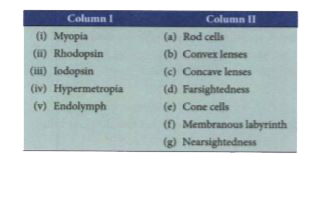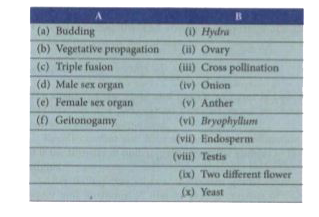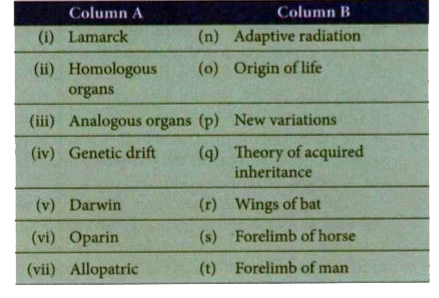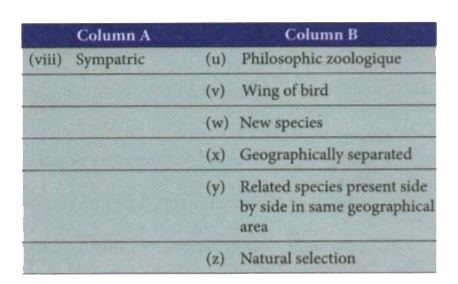Match with one or more than one correct answer.

(i)→(c),(g) (ii)→(a)
(iii)→(e) (iv)→(b),(d)
(v)→(f)
Topper's Solved these Questions
- NERVOUS SYSTEM AND SENSE ORGANS : CONTROL AND CO-ORDINATIONBOOK - CENGAGE BIOLOGYCHAPTER - NERVOUS SYSTEM AND SENSE ORGANS : CONTROL AND CO-ORDINATIONEXERCISE - OLYMPIAD AND NTSE LEVEL EXERCISES
10 Videos
- NERVOUS SYSTEM AND SENSE ORGANS : CONTROL AND CO-ORDINATIONBOOK - CENGAGE BIOLOGYCHAPTER - NERVOUS SYSTEM AND SENSE ORGANS : CONTROL AND CO-ORDINATIONEXERCISE - CHALLENGING EXERCISE
2 Videos
- NERVOUS SYSTEM AND SENSE ORGANS : CONTROL AND CO-ORDINATIONBOOK - CENGAGE BIOLOGYCHAPTER - NERVOUS SYSTEM AND SENSE ORGANS : CONTROL AND CO-ORDINATIONEXERCISE - MANDATORY EXERCISE (EXERCISE SET II)
17 Videos
- MENDELIAN INHERITANCEBOOK - CENGAGE BIOLOGYCHAPTER - MENDELIAN INHERITANCEEXERCISE - CHALLENGING EXERCISE
12 Videos
- NUTRITION IN PLANTS AND ANIMALS BOOK - CENGAGE BIOLOGYCHAPTER - NUTRITION IN PLANTS AND ANIMALS EXERCISE - CHALLENGING EXERCISE
4 Videos
Similar Questions
Knowledge Check
Vernier constant is the (One or more than one correct option may be correct option may be correct):
Avalue of one MSD divided by total nimber of divisions on the main scale.Bvalue of one VSD divided by total number of divisions on the vernier scale.Ctotal number of divisions on the main scale divided by total number of divisions on the vernier scale.Ddifference between the value of one main scale division and one vernier scale division.The quivalnet conductance of any electrolyte MA at infinite dilution ∧∘.(MA) is equal ( more than one correct answer)
A∧∘.(MA)=∧c−.(MCl)+∧∘.(NaA)+∧∘.(NaCl)B∧∘.(MA)=∧c−.(MCl)+∧∘.(NaA)−∧∘.(NaCl)C∧∘.(MA)=λ∘.(M⊕)+λ∘.(Ac−)D∧∘.(MA)=∧c−.(MCl)+∧∘.(NaA)−∧∘.(NaCl)
Match the following with more than one correct answer.

View SolutionVernier constant is the (One or more than one correct option may be correct )
View SolutionThe quivalnet conductance of any electrolyte MA at infinite dilution ∧∘.(MA) is equal ( more than one correct answer)
View SolutionIn a multiple choice question, there are four alternative answers of which one or more than one is correct A candidate will get marks on the question only if he ticks the correct answer. The candidate decides to tick answers at a random. If he is allowed up to three chances to answer the question, then find the probability that he will get marks on it.
View SolutionIn a multiple choice question, there are four alternative answers of which one or more than one is correct A candidate will get marks on the question only if he ticks the correct answer. The candidate decides to tick answers at a random. If he is allowed up to three chances to answer the question, then find the probability that he will get marks on it.
View SolutionIn a multiple choice question, there are four alternative answers of which one or more than one is correct A candidate will get marks on the question only if he ticks the correct answer. The candidate decides to tick answers at a random. If he is allowed up to three chances to answer the question, then find the probability that he will get marks on it.
View Solution


